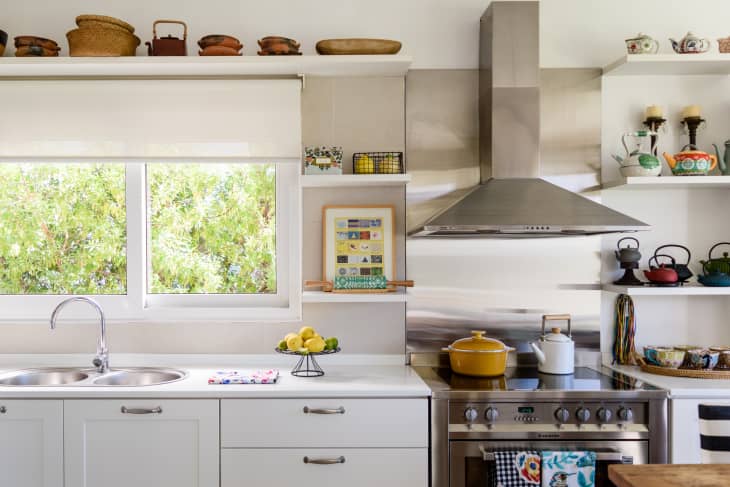Want White Countertops? Here Are Your Best Bets

White countertops are white-hot right now, and for good reason: they’re bright, light, and add a sense of cleanliness that’s appealing in food prep areas. And while some may decry white counters as “boring” and “plain,” the truth is they are available in a wide variety of materials, each with their own texture and aesthetic, and each with pros and cons.
White Marble
If you want perfection don’t get marble — it’s been known to stain and etch and develop a “patina” over time. But if you want a classic and timeless choice for countertops that’s versatile enough to look good in a wide variety of kitchens, then natural marble might be for you. Read the comments on this post if you’re curious about what other readers have to say about the cost and value of marble. Options include the cheaper Carrara, Danby and Statuarietto, and the more premium Calacatta.
White Quartz
Quartz has dramatically risen in popularity in recent years, for good reason. Quartz is a non-porous material that resists stains and etching — so rest easy red wine lovers —and doesn’t harbor bacteria. Like dekton, it also doesn’t require the periodic sealing that comes with marble and granite. It is, however, vulnerable to hot pans and discoloration when exposed to sun (it’s not a good surface to use for outdoor kitchens). Also note that, if your counters are quite large, they almost certainly will have visible seams. It’s also one of the more expensive options. Common brands are Cosentino (Silestone), DuPont (Zodiaq), Cambria, Caesarstone, Santa Margherita and Technistone — all of whom have lots of white options.
White Granite
Granite is a natural material, meaning every single piece comes from the earth and is uniquely beautiful. It’s very durable, but, due to its porous nature, it can stain if spilled substances are left to linger for too long, and needs to be sealed (and resealed annually) in order to fully protect the surface. Still, it is very highly rated by Consumer Reports: “Like quartz, granite survived our spills, hot pots, knives, and more with top scores,” but note that it can chip. Although granite is typically more affordable that quartz, some of the whiter slabs are often considered high tier stones which might drive the price higher. Your best bet is visiting a granite yard to pick out your slab. Popular options include: River White, Bianco Antarctica, and Princess White.
White Concrete
Concrete is a versatile material that can be molded and shaped into various shapes and finished with a variety of coatings — but keep in mind that it does need to be sealed in order to be water-resistant, and topical sealants are not heat resistant. Furthermore, concrete is easily stained and prone to chips, scratches, and hairline cracks. It is, however, gorgeous, if you’re up to caring for a high-maintenance material. It’s not cheap if you hire professionals to do the job. But, if you love the look but the price gets you down, Chris Loves Julia has a thorough tutorial on how to do it yourself —a labor-intensive but much more affordable route: about $30 per square foot.
White Laminate
As you can see, laminate (or Formica, as it’s often called in reference to one of the most popular brands) is the most-affordable option on this list. New colors, profiles and patterns have emerged in recent years, giving you a wider range of options. Laminate is known for its low price and ease of installation. Formica countertops are not plastic, but a combination of pressure treated resin-soaked kraft paper and melamine. Laminate does not need to be sealed and it’s easy to clean, but it is does have other vulnerabilities. It can stain and is damaged by hot pans, sharp knives, and abrasive cleaners. If water gets through the seams, it can also warp. Available brands include Wilsonart, Formica and IKEA.
White Quartzite
Unlike manmade quartz, quartzite, by comparison, is a metamorphic rock that originated as sandstone. It comes from a quarry and is formed by manufacturers into finished slabs. It’s known for its natural sparkles and hues. It does need to be sealed (and periodically resealed) and is limited to the shapes and sizes that can be mined and cut, unlike the manufactured quartz. It is also known for being quite durable. Popular options include Super White (actually dolomite marble or calcite marble, but often sold as quartzite), White Macuaba, and Luce di Luna. Please note that different providers use different names for their slabs, so your best bet is visiting a stone yard to look at what’s available in person.
Do you have experience with white countertops? What were they made of, and how did they hold up to daily use?
